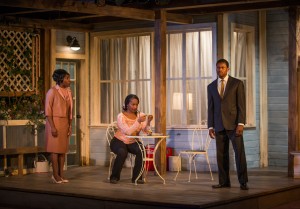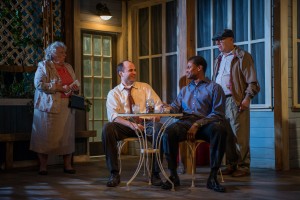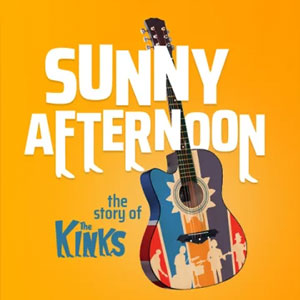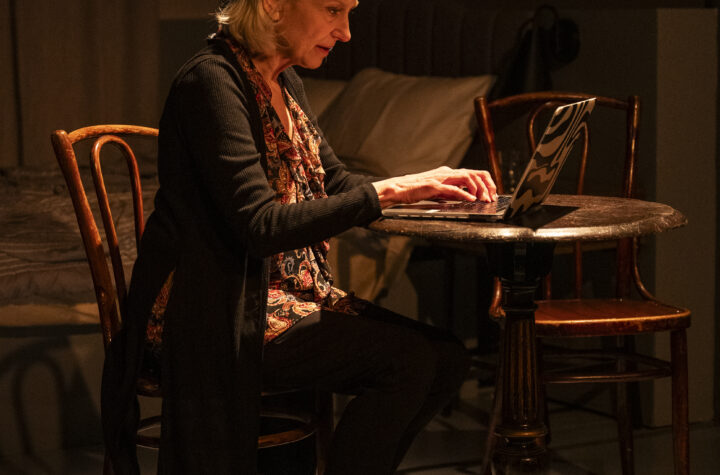
 [rating=3] Buying one’s first house is more than just “moving up”. To many, it is a true sign of adulthood and to some a sign that they have “made it”, they are a success. Despite all of the crazy mortgage schemes of recent years, there were other housing “schemes”, many years ago , ones that most of us are unaware of. They were called “ghost buying” and were used to assist African Americans to get homes in areas that were “segregated”. How it works, for the most part is explained in Kirsten Greenridge’s “Luck of the Irish”, now making its Midwest Premiere at Next Theatre in Evanston.
[rating=3] Buying one’s first house is more than just “moving up”. To many, it is a true sign of adulthood and to some a sign that they have “made it”, they are a success. Despite all of the crazy mortgage schemes of recent years, there were other housing “schemes”, many years ago , ones that most of us are unaware of. They were called “ghost buying” and were used to assist African Americans to get homes in areas that were “segregated”. How it works, for the most part is explained in Kirsten Greenridge’s “Luck of the Irish”, now making its Midwest Premiere at Next Theatre in Evanston.
A “Ghost Purchase” is where a White person buys a home and then signs it over to the Black family. In the 1950’s it was taking place in many major cities that were not integrated. In this play, we live through one of these transactions of the 1950’s along with the current residents of the home in question in the 2000’s. The story starts out in the “now”. Two sisters, Hannah ( Lily Mojekwu) and Nessa ( Lucy Sandy) have been waiting in the yard for a visit from who they think may have been friends of their grandparents for a memorial service. The Donovan’s, as it turns out were the “Ghost Buyers” of this family home, where they were raised and as the story unfolds, going from the past to the present, we meet all of teh characters and view the comings and goings of the transaction in question.
The Donovans are played by different actors as we spread the story over these 50 years. In the begining ( and for the majority of the action) Joe Donavan is played by Chris Rickett and his wifePatty Anne by Cora Vander Broek. They are both solid in their performances of a poor couple, raising 6 kids in an area not far from Boston, where he attempts businesses that fail and she takes in laundry to survive. They agree to “Ghost purchase” a home for a young Doctor ( solidly played by Andre’ Teamer) and his wife, Lucy ( deftly handled by Mildred Marie Langford). They have two daughters and want nothing more than to get into this lovely house in this wonderful neighborhood so that they can have all the advantages available.
What happens in this story is that Mrs. Donovan feels that now that the grandma has “passed” it is time to take over and move into what she feels is her house, and that is where the story line takes us. Did the transfer ever take place? Who has what papers? Who is the real owner of the house? As we watch the story unfold, as directed by Damon Kiely, we learn a great deal about the times and the problems of race and class, not only in the 1950’s, but today!
Next Theatre Company produces plays that present awareness to social items that can come alive through live theater and this play certainly fits that “mission”. I , for one had heard something about “Ghost Purchasing” as a kid, but never really understood what it meant as I was a kid. This story opens up a subject that may still be going on in other communities where racial inequities still exist.
This particular play is based on a real situation that the playwright’s family went through. According to her notes, her grandmother went with a friend to purchase a home, but nothing went wrong. In this play, it becomes a nightmare for the grand daughters of Lucy and their family ( Hannah’s husband Rich ( Austin Talley) and son ( Miles ( the adorable Mesiyah Oduro-Kwarten). These young ladies have their own social problems. Their mother left the house and them to their grandmother and they have lived as the only Blacks in the neighborhood all their lives.
I did have a problem with the idea of the “other” sister, their Aunt and what happened to her. Why did she not claim the home? But perhaps that is another story. I found this to be a worth the trip to Evanston on a cold wintry night production that warmed the heart ( if not the body) and taught me a little history at the same time. Jackie and Rick Penrod, once again, have created a set that almost feels like you might want to sit on the patio, have a drink and breath in the clean air that was so important to both the Donovans and Taylors. The lighting by Jared Gooding was a bit dark in one or two scenes, but otherwise set the mood and the costumes (Samantha Jones) did meet the different time periods to perfection. Eileen Rozycki ( props) and Mikhail Fiksel( sound) round out the tech crew who did a splendid job.
The title of the play, “The Luck Of The Irish” does not refer, by the way to anything more than an old expression that really means that if you have the “luck of the Irish” it is BAD LUCK, not good ( this was coined during the days when Irish people came over to the US due to the famine in Ireland. So there are no Leprechans or pots of gold and you should not get excited if someone tells you that you have “the Luck of the Irish”.
This production will continue at Nex Theatre, located at 927 Noyes Street ( just East of Ridge Avenue) in Evanston, through February 23rd with performances as follows:
Fridays at 8 p.m.
Saturdays at 8 p.m.
Sundays at 2 p.m.
Tickets start at $30 and are available at the box office, by calling 847-475-1875 ext 2 or online at www.nexttheatre.org
Saturday afternoon performances at 4 p.m. will be added in February ( the 1st,8th,15th and 22nd).
There is parking in the lot next to the theater as well as on the street and public transportation will get you a block away
On Sundays shows, talkbacks will take place after the show which are included with your tick
To see what others are saying, visit www.theatreinchicago.com, go to Review Round-up and click at “The Luck Of The Irish”.








More Stories
“Titanique”
“Sunny Afternoon” reviewed by Carol Moore
“No Such Thing”